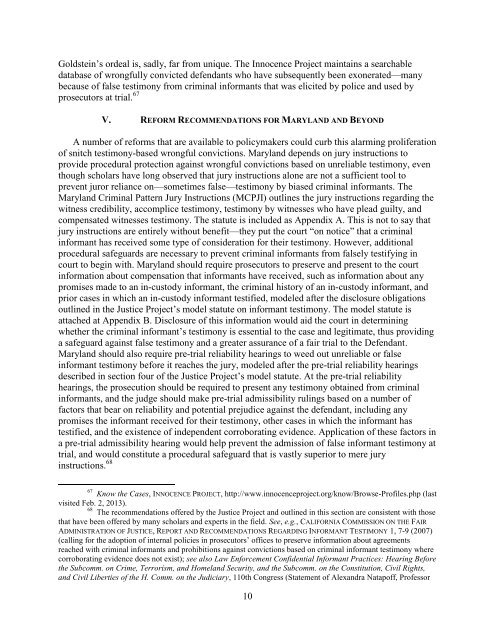attachment_id=996 - UDC Law Review
attachment_id=996 - UDC Law Review
attachment_id=996 - UDC Law Review
Create successful ePaper yourself
Turn your PDF publications into a flip-book with our unique Google optimized e-Paper software.
Goldstein’s ordeal is, sadly, far from unique. The Innocence Project maintains a searchable<br />
database of wrongfully convicted defendants who have subsequently been exonerated—many<br />
because of false testimony from criminal informants that was elicited by police and used by<br />
prosecutors at trial. 67<br />
V. REFORM RECOMMENDATIONS FOR MARYLAND AND BEYOND<br />
A number of reforms that are available to policymakers could curb this alarming proliferation<br />
of snitch testimony-based wrongful convictions. Maryland depends on jury instructions to<br />
provide procedural protection against wrongful convictions based on unreliable testimony, even<br />
though scholars have long observed that jury instructions alone are not a sufficient tool to<br />
prevent juror reliance on—sometimes false—testimony by biased criminal informants. The<br />
Maryland Criminal Pattern Jury Instructions (MCPJI) outlines the jury instructions regarding the<br />
witness credibility, accomplice testimony, testimony by witnesses who have plead guilty, and<br />
compensated witnesses testimony. The statute is included as Appendix A. This is not to say that<br />
jury instructions are entirely without benefit—they put the court “on notice” that a criminal<br />
informant has received some type of consideration for their testimony. However, additional<br />
procedural safeguards are necessary to prevent criminal informants from falsely testifying in<br />
court to begin with. Maryland should require prosecutors to preserve and present to the court<br />
information about compensation that informants have received, such as information about any<br />
promises made to an in-custody informant, the criminal history of an in-custody informant, and<br />
prior cases in which an in-custody informant testified, modeled after the disclosure obligations<br />
outlined in the Justice Project’s model statute on informant testimony. The model statute is<br />
attached at Appendix B. Disclosure of this information would aid the court in determining<br />
whether the criminal informant’s testimony is essential to the case and legitimate, thus providing<br />
a safeguard against false testimony and a greater assurance of a fair trial to the Defendant.<br />
Maryland should also require pre-trial reliability hearings to weed out unreliable or false<br />
informant testimony before it reaches the jury, modeled after the pre-trial reliability hearings<br />
described in section four of the Justice Project’s model statute. At the pre-trial reliability<br />
hearings, the prosecution should be required to present any testimony obtained from criminal<br />
informants, and the judge should make pre-trial admissibility rulings based on a number of<br />
factors that bear on reliability and potential prejudice against the defendant, including any<br />
promises the informant received for their testimony, other cases in which the informant has<br />
testified, and the existence of independent corroborating evidence. Application of these factors in<br />
a pre-trial admissibility hearing would help prevent the admission of false informant testimony at<br />
trial, and would constitute a procedural safeguard that is vastly superior to mere jury<br />
instructions. 68<br />
67 Know the Cases, INNOCENCE PROJECT, http://www.innocenceproject.org/know/Browse-Profiles.php (last<br />
visited Feb. 2, 2013).<br />
68 The recommendations offered by the Justice Project and outlined in this section are consistent with those<br />
that have been offered by many scholars and experts in the field. See, e.g., CALIFORNIA COMMISSION ON THE FAIR<br />
ADMINISTRATION OF JUSTICE, REPORT AND RECOMMENDATIONS REGARDING INFORMANT TESTIMONY 1, 7-9 (2007)<br />
(calling for the adoption of internal policies in prosecutors’ offices to preserve information about agreements<br />
reached with criminal informants and prohibitions against convictions based on criminal informant testimony where<br />
corroborating evidence does not exist); see also <strong>Law</strong> Enforcement Confidential Informant Practices: Hearing Before<br />
the Subcomm. on Crime, Terrorism, and Homeland Security, and the Subcomm. on the Constitution, Civil Rights,<br />
and Civil Liberties of the H. Comm. on the Judiciary, 110th Congress (Statement of Alexandra Natapoff, Professor<br />
10














